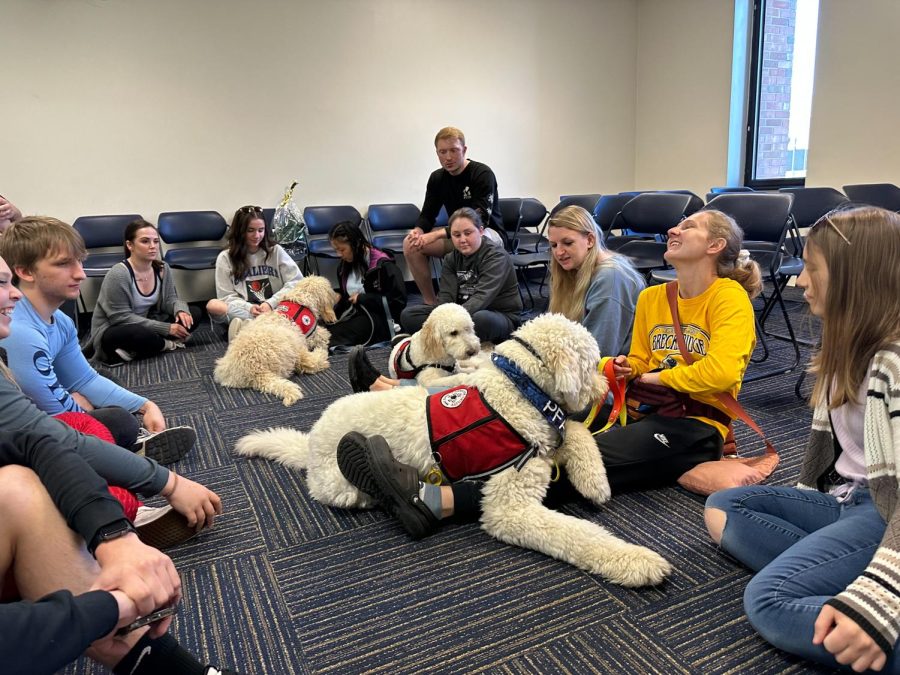‘Paws for Mental Health’ event helps students destress before finals
Paws 4 Mental Health puppies in training visiting the meeting.
April 29, 2023
The student organizations Active Minds and Paws for a Cause gave students a presentation on service dogs followed by time to pet and interact with the dogs Wednesday.
Hunter Frey-Burkart, a junior neuroscience major and president of Active Minds, said that the main goal of the meeting was to help students de-stress before finals week.
“I thought it’d be a really great way to end the semester because it’s a very stressful time for everyone,” he said. “The main goal of Active Minds is to bring awareness to mental health and resources that are available to help people that are struggling. This kind of event is perfect for that.”
Burkart said that there are several different types of service animals that each have different rights for what they can do to help people.
“An emotional support animal is primarily trained to provide emotional support through companionship. They also must be prescribed by a therapist or psychiatrist to provide help for someone with a psychological disorder, ” he said. “A service animal is specifically trained to perform certain tasks to help people with disabilities; they are trained to specifically handle a specific person’s disability. A therapy dog volunteers in clinical settings to provide comfort and affection.”
He also said the most important thing that each of them share is that they provide comfort to anyone you’d interact with; that’s part of their main job.
“Some other animals that can be used as therapy animals are cats, rabbits, birds and miniature horses,” he said. “Emotional support animals that can be used are the same as the different therapy animals, while also including ferrets, and some pigs. Service animals can include both miniature horses and dogs.”
Jenna Arthur, a senior audiology major and president of Paws for a Cause, together with other members of her group brought in a couple service dogs to interact with students after Burkart’s presentation.
“We do a lot of de-stress events, especially towards the end of finals and midterms,” she said. “We let the dogs come in and let people pet them, hang out with them and get puppy love. We always try to do as many things as we can with other organizations; we have an event with the Honors College and other de-stress events.”
Paws for a Cause is a student organization on campus that partners with Four Paws for Ability, which is a nonprofit organization that raises, trains and places service dogs for children and veterans with disabilities, she said.
“If our dogs do not get placed as a service animal they can become a breeder and go into a guardian home while they’re an active breeder. After that they can be adopted out,” she said. “If they completely fail out of the program, we call them ‘fabulous flunkies.’ There are stipulations that us trainers can meet and qualify for in order to adopt our dog, but if other people want to adopt them there is a waitlist.”
Arthur said that Active Minds reached out to them, asking if they would be interested in bringing in some of their service dogs in training to help students de-stress.
“A lot of our dogs are really soft and by petting them it can help the release of hormones that make us calm,” she said. “They just bring a lot of joy. They’re always silly, always making people smile. Honestly, just petting a dog makes everyone happy.”
Arthur said their program has 12 dogs training on campus right now. The dogs can be in the program for about a year to a year and a half until they discover the path that is ultimately right for them.
“Four Paws for Ability can place any service dog and there are a wide range of potential placements: hearing, seeing, diabetic, seizure,” she said. “There are a lot of different paths they can choose from, and it’s all based on the dog and based on their personalities that they’ll find fit the path that’s right for them.”
Molly Hoffer is a reporter. Contact her at [email protected].

























